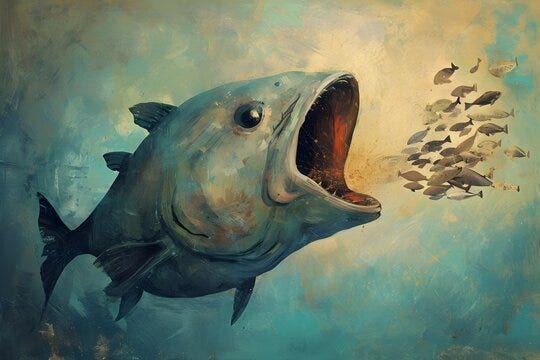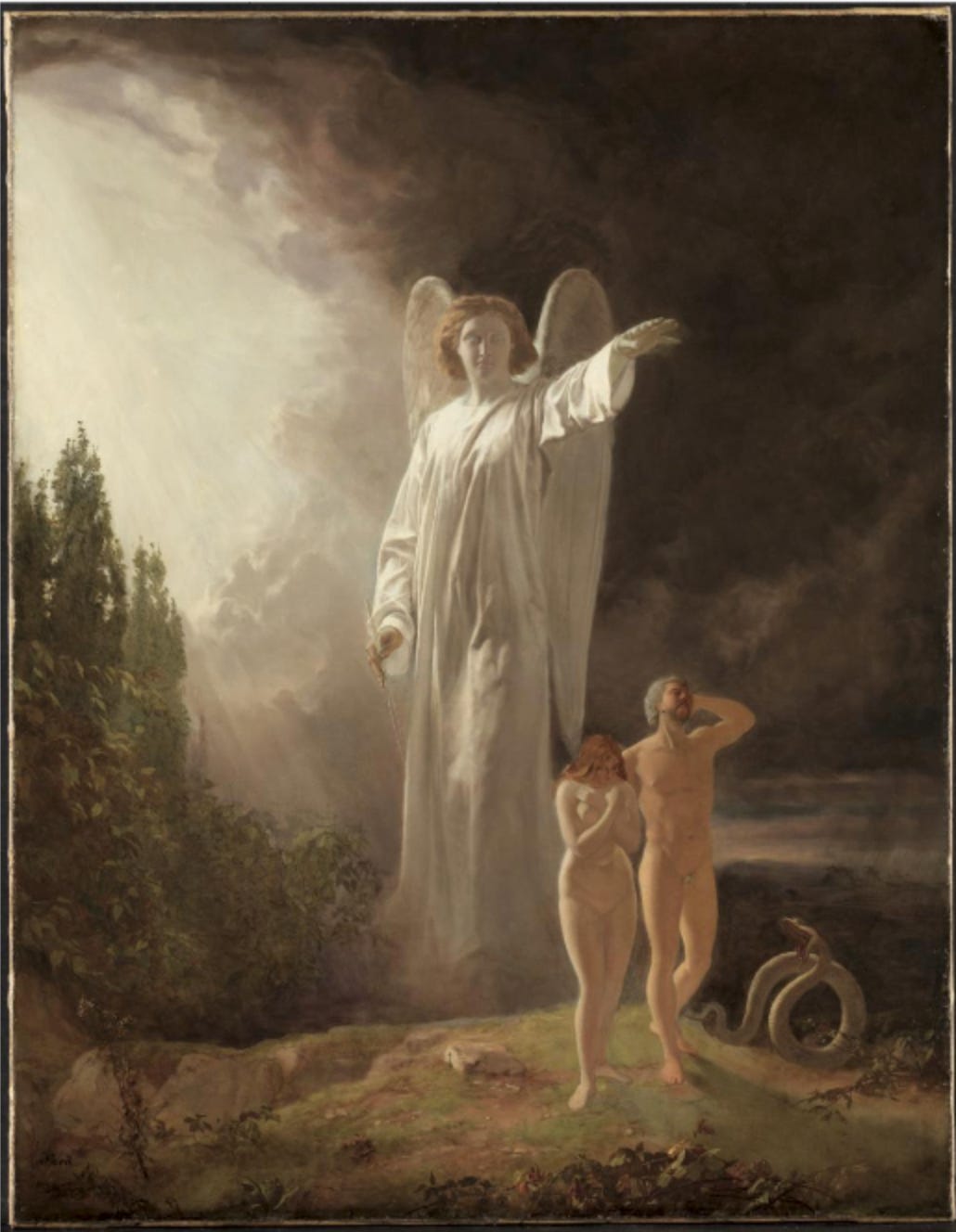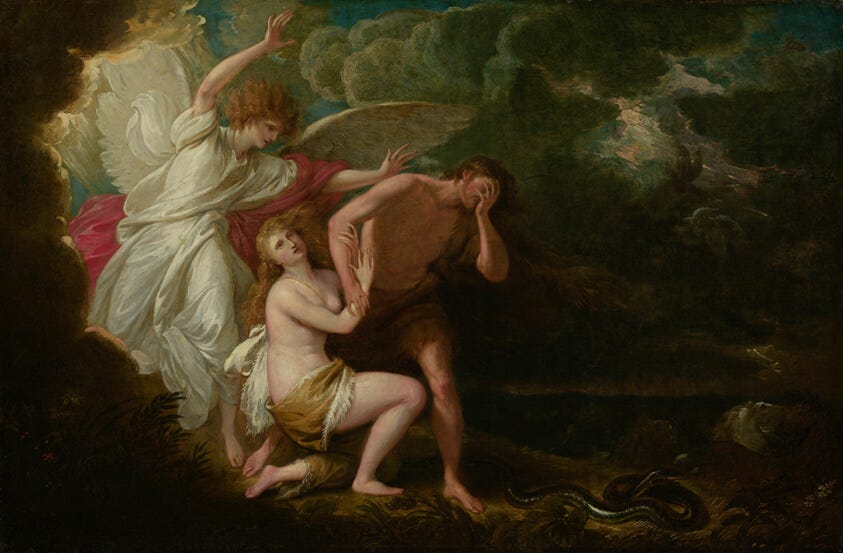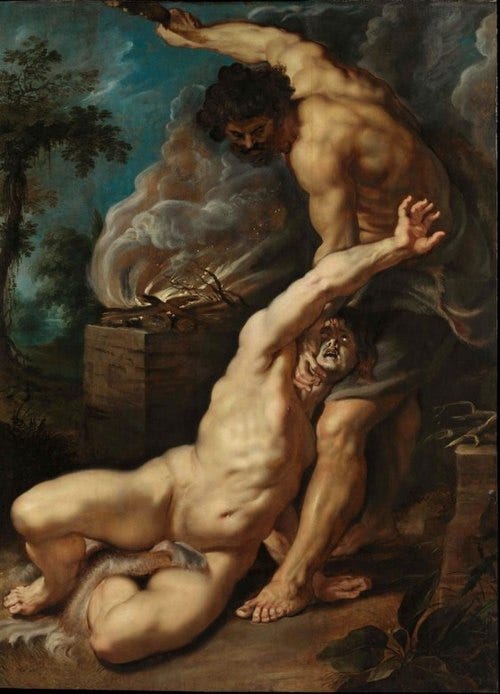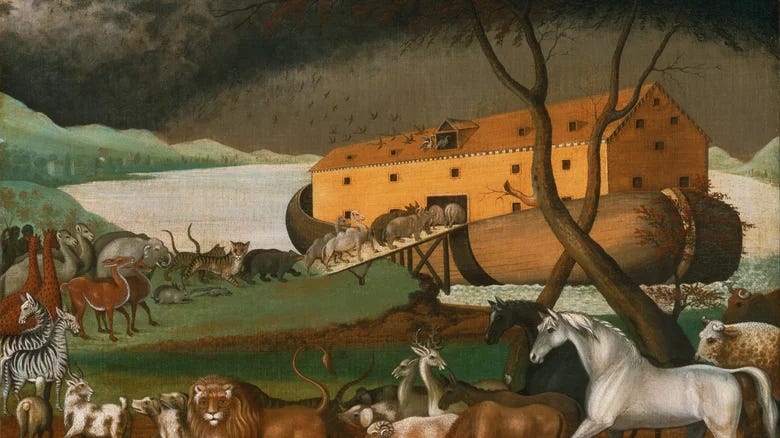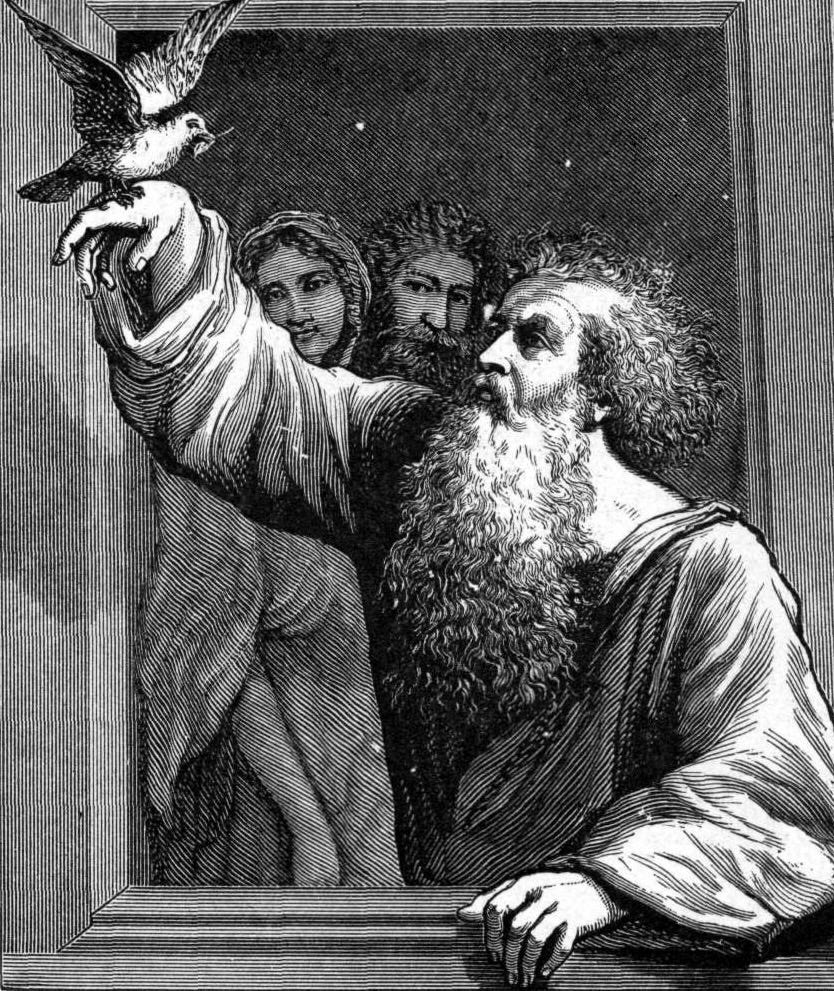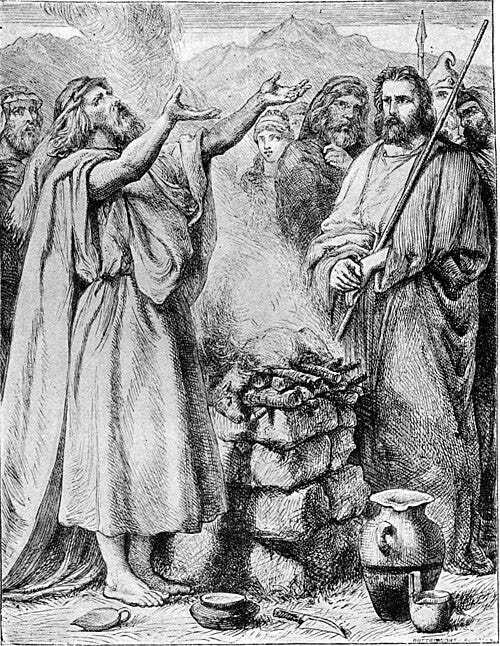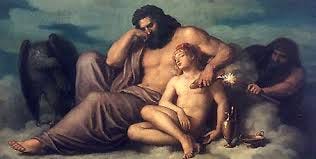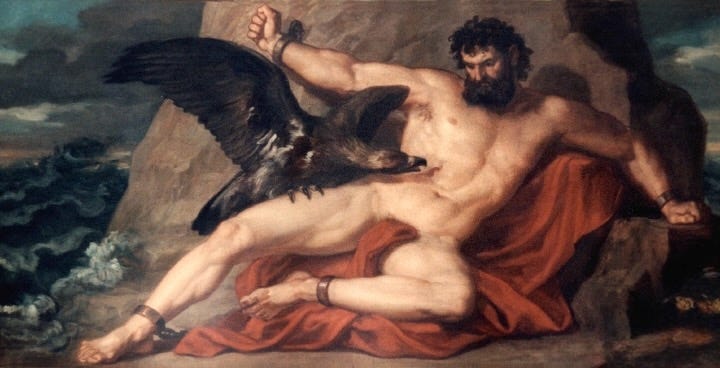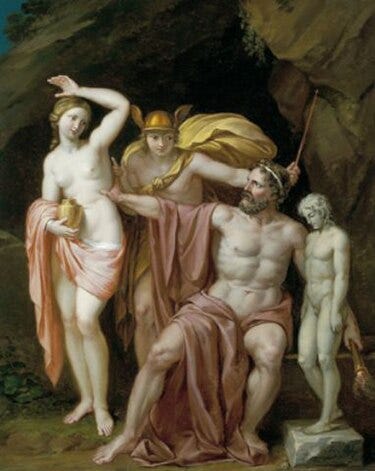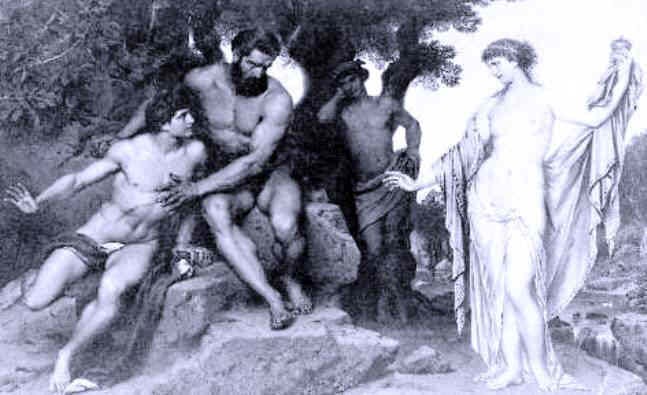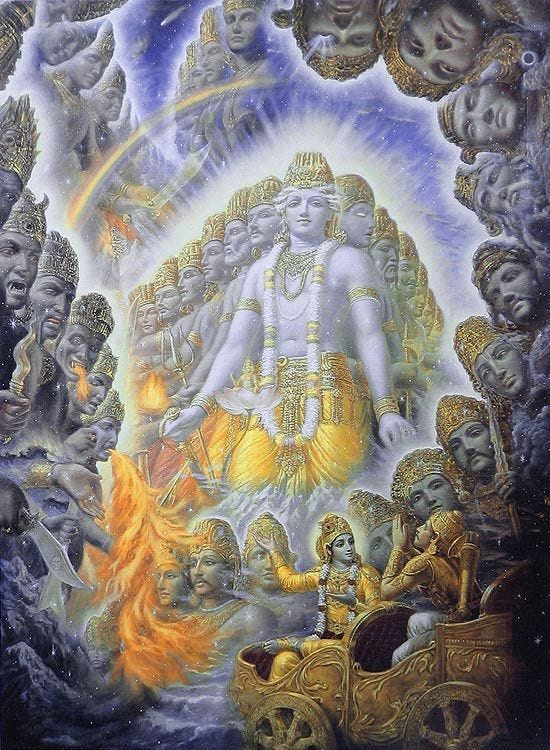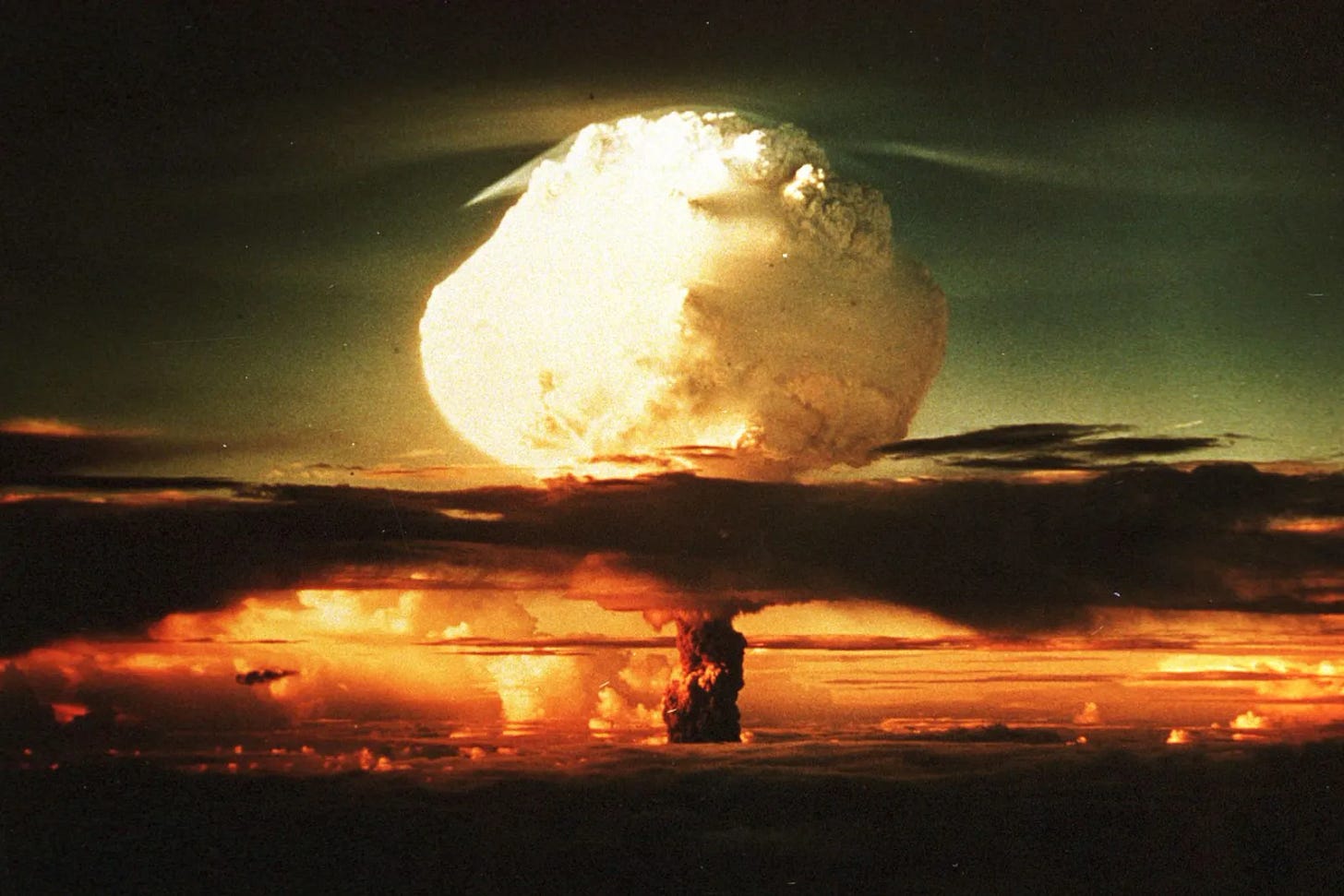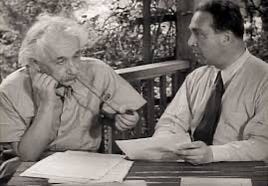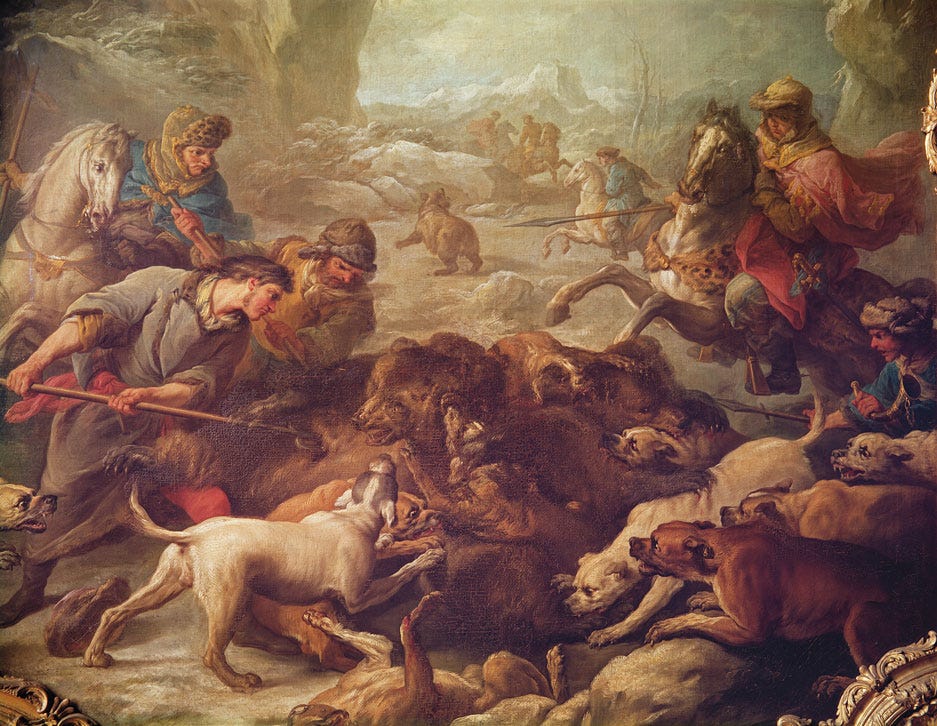The Law of the Fishes
PRELUDE
“The world hangs on a thin thread, and that is the psyche of man. Nowadays, we are not threatened by elementary catastrophes. There is no such thing (in nature) as an H-bomb; that is all man's doing. We are the great danger. The psyche is the great danger. What if something goes wrong with the psyche?” - BBC interview in 1959, Carl Jung
Jung was speaking at a time when mankind was not threatened by ‘elemental catastrophes.’ In 1959, our world was not concerned with a rise in greenhouse gas concentrations, global temperature rise, increasingly severe storms and hurricanes, forest fires, drought, rising oceans, loss of species, insufficient food, health risks to whole populations, destruction of rainforests, and widespread pollution of rivers, lakes, and oceans. But all of this and more has now become a clear and present danger.
The first successful test of an H-Bomb had taken place in November 1952 (Seven years before he gave this interview) on a small Pacific island at Enewetak Atoll in the Marshall Islands; today, there are nearly 4000 active nuclear H-bombs, each one of them hundreds or even thousands of times more powerful than the atomic bombs dropped on Hiroshima and Nagasaki.1
This post contains numerous informative footnotes. Once you have clicked on a NUMBERED FOOTNOTE in the text, the simplest and easiest way to return to where you were in the main text is to USE YOUR BROWSER’S BACK BUTTON. This works well on the web version of the post. The BACK BUTTON in a web browser allows you to navigate back to the previously visited web page in your browsing history. It's typically located in the top left corner of your browser window as an arrow pointing to the left. If you do not use the BACK BUTTON, you will have to scroll up to find your place again. If you are viewing the article on the Substack App, you can just click the underlined number in the text to go to the Footnote and in the Footnote to return to the text.
Presently, nine countries possess H-bombs, and others have or are developing atomic bombs. There is an H-bomb aimed at every major city, army base, and power plant in America and Russia, and over the years, we have developed more effective ways to employ such weapons. If war breaks out and H-bombs are used, a global catastrophe will occur with devastating consequences for humanity and the planet.
The use of such weapons has grown more possible; even this year (in June of 2025), Vladimir Solovyev, Putin’s top propagandist, responding to questions about peace talks with Ukraine, declared that Russia would never cease its attacks against the Ukrainian people, saying,
“We can destroy the world several times over. Who needs the world if Russia is not in it?”
Vladimir Putin and Vladimir Solovyev
These are the words of a man representing a country (Russia) who is threatening to kill himself and his country and people. He says he will take the world with him if he does not get what he wants. Such threats have been seen before in history, and some of these people did kill themselves, and took others with them. Putin (and his mouthpieces) have threatened the use of nuclear bombs against any nation that opposes Russia’s illegal, murderous, and destructive actions regarding Ukraine.2 All of this is horrible, menacing, disturbing, and threatening to the whole world. We are faced with the question of what we should do. In our consideration, we must not forget it is man who created these bombs, and only man can employ them; their use (or non-use) rests wholly in man's hands. What follows here is an examination of the Nature of Man and the Law of Nature, for if we are dealing with the Psyche or Nature of Man, it is essential that we understand what we are dealing with and what man has already done. These stories are intended to aid in that consideration.
Climate change and the pollution of air, sea, land, and water are disruptions that threaten the ecology of our planet, and H-bombs threaten the whole world with destruction if ever used. Man created these crises through his ignorant, selfish use of technology, and the results of these actions now pound at our door, threaten our lives, and demand to be recognized.
The Doomsday Clock3 has recently been moved forward; we are now at 89 seconds to midnight (Doomsday), the closest to a global catastrophe we have ever been. So, since time is of the essence, let us consider the thread on which the world hangs: the Psyche or Nature of man.
Introduction
‘If a path to the better there be, It begins with a full look at the worst.” – Thomas Hardy
I’ve heard many solutions to the plight of mankind, but when we look at history, none of them worked for very long. No system of government, no law or parliament, no ruler or tyrant, not even religious teachings or teachers, have succeeded in changing the nature and accumulated moral actions of mankind. We have, however, dramatically altered the world around us. Especially in the last hundred years, the possibility of a better world for everyone has grown with the development of technology. For the first time in history, we can provide everyone on earth with a standard of living better than that of the kings of old.4 Even so, because of the irresponsible, selfish, stupid, and primitive use of this same technology, the potential for nuclear war, as well as the environmental destruction of our whole planet, draws us nearer to a day of reckoning. Instead of suggesting a remedy, I propose an exploration of ‘the problem’ . . . a consideration of the Nature of man, for man’s psyche is the thread by which we hang.
“Whatever we are unconscious of happens to us outwardly as fate.” - Carl Jung
Most of us consider ourselves to be good and benign, even though our world continues to be full of violence, anger, greed, desire, killing, war, indifference, ignorance, and suffering. We have achieved the technological ability to destroy civilization quickly if we employ hydrogen bombs in a war, and yet more and more of these bombs and more efficient ways to deliver them are presently being built. Even if we fail to destroy ourselves in a nuclear Armageddon, we are speedily ruining the ecology of our planet through pollution and disruption of the Earth’s climate. Although it is clear that the very existence of our world is threatened more than ever before, is this inevitable? Is it our nature to bring this about? Christian and Greek Mythology tell us that man has been evil since his beginnings and cursed by God in one way or another…
I am not suggesting there is no ‘good’ to be found in man, I have seen and experienced much that is good and noble in the world. But perhaps what is r ‘good’ is only a thin film of morality and civilization that floats upon the dark pool of our animal nature. History has shown that in times of great dilemma, we may have to choose the lesser of two evils, even if we do not want to. Many who seek to practice morality often find themselves engaging in immoral actions when faced with a dilemma.
This does not mean we should not or cannot strive to make the world a better place to live. It does mean that our quest is never perfect and never-ending, and so far, we have not succeeded; rather, mankind has arrived at a dead end, an extreme and potentially terminal moment. As a result of not doing what is good and beneficial, we find ourselves in a perilous time. Is it a lack of recognition of our Nature that has brought us to this point, or does the Law of Nature give us no other choice?
Principles
“Man cannot make principles; he can only discover them.” - Thomas Paine
‘Principles,’ or what we often call ‘the Laws of Nature,’ were originally communicated in the form of what we call Myths. Myths are not ‘history.’ They are not meant to be, but in every world culture, Myths illustrate eternal principles, employing the drama of human characters, and the play of God or gods. (Similar tales also appear in Fables, where animals, plants, and inanimate objects, instead of humans and Gods, are the actors).
Myths do not describe a specific historical event that occurred at a particular time, such as the identity of the king, the location of the Garden of Eden, the exact type of animals taken onto Noah’s Ark, or how the world was created. Myths and fables endure not because they convey histórical facts, but because of eternal Truths they reveal. The language of Myth has always been, and will always be, symbolic.
“Every Myth is psychologically symbolic. Its narratives and images are to be read, therefore, not literally, but as metaphors.” - Joseph Campbell
Very few written documents or books existed a thousand years ago. Ancient cultures verbally recited mythic stories, and poets, scholars, storytellers, ballad makers, and troubadours interpreted and changed them. Over time, some of these stories were written down, and although versions may vary, modern scholars and students of comparative mythology and religion continue to find shared themes and principles amongst widely separated cultures and continents.
Myths arise like mushrooms sprouting from the edge of a single vast, seemingly eternal mycelium. We can see the individual mushrooms, but their source, that great, hidden, underground mycelium, remains unseen, whole, unchanged, and eternal.
A Fairy Ring of Mushrooms
One of the most well-known Myths in the West today is found in the book of Genesis. It tells one of the earliest mythological Jewish-Christian stories about the Creation of Man, the Nature of Man, the Nature of the World, and the Nature of God.
According to Genesis, Adam and Eve disobeyed God's commandment, ate the fruit of the Tree of Knowledge, and became aware of the difference between Good and Evil. However, even though they (and through them mankind) came to know this difference, throughout history, their progeny continued to disobey God and choose evil. Here is a very brief overview of the Old Testament story of the creation of Adam and Eve, and God’s critique of human nature.
Adam and Eve in the Garden of Eden. Eve receives the apple from the snake and hands it to Adam
Genesis, the Creation of Man and The First Curse of God
And the LORD God took Adam, the man, and put him into the garden of Eden to dress it and to keep it. And the LORD God commanded the man, saying, Of every tree of the garden thou mayest freely eat: But of the tree of the knowledge of good and evil, thou shalt not eat of it: for in the day that thou eatest thereof thou shalt surely die. — Genesis 2:16–17
But then, the serpent who lived in that garden and must have been put there by God (who else?) spoke the truth and said to Eve:
‘Ye shall not surely die: For God doth know that in the day ye eat thereof, then your eyes shall be opened, and ye shall be as gods, knowing good and evil.’
And when the woman saw that the tree was good for food and that it was pleasant to the eyes, and a tree to be desired to make one wise, she took of the fruit thereof, and did eat, and also gave unto her husband with her, and he did eat. And the eyes of them both were opened, and they knew that they were naked, and they sewed fig leaves together and made themselves aprons. — Genesis 3:4-6
Later, when God walked in the garden, Adam and Eve hid themselves from Him because ‘their eyes were opened’; they had disobeyed Him and become ashamed. They were now self-conscious, aware of their sexuality, perhaps embarrassed by their desire for each other, and they sought to hide it from each other and themselves from God. And God spoke to them and said,
‘Who told thee that thou wast naked? Hast thou eaten of the tree, whereof I commanded thee that thou shouldest not eat?’
And the man replied,
‘The woman whom thou gavest to be with me, she gave me of the tree, and I did eat.’And the LORD God said unto the woman, What is this that thou hast done? And the woman said, The serpent beguiled me, and I did eat. — Genesis 11-13
Adam blamed God for giving Eve to him and Eve for giving him the apple. Eve blamed the serpent, telling God that the serpent deceived her into eating it. God then cursed the serpent, the woman, and the man and punished them, expelling them from the Garden, seeking to prevent Adam and Eve from eating also from the Tree of Eternal Life and becoming immortal.
And the LORD God said unto the serpent, Because thou hast done this, thou art cursed above all cattle, and above every beast of the field; upon thy belly shalt thou go, and dust shalt thou eat all the days of thy life: And, I will put enmity between thee and the woman, and between thy seed and her seed; it shall bruise thy head, and thou shalt bruise his heel.
Unto the woman, he said, I will greatly multiply thy sorrow and thy conception; in sorrow, thou shalt bring forth children; and thy desire shall be subject to thy husband, and he shall rule over thee.
Angel driving Adam and Eve out of the Garden of Eden
And unto Adam, he said, Because thou hast hearkened unto the voice of thy wife, and hast eaten of the tree, of which I commanded thee, saying, Thou shalt not eat of it: cursed is the ground for thy sake; in sorrow shalt thou eat of it all the days of thy life; Thorns also and thistles shall it cause to bud and bring forth to thee; and thou shalt eat the herb of the field;
In the sweat of thy face shalt thou eat bread, till thou return unto the ground; for out of it wast thou taken: for dust thou art, and unto dust shalt thou return. And the LORD God said, Behold, the man is become as one of us, to know good and evil: and now, lest he put forth his hand, and also take of the tree of life, and eat, and live for ever: Therefore the LORD God sent him forth from the garden of Eden, to till the ground from whence he was taken. — Genesis 3: 14-23
Adam and Eve driven out of the Garden of Eden
Not only did God not want Adam and Eve to eat from the Tree of the Knowledge of Good and Evil, but they were also forbidden to eat from the Tree of Life, as they would then ‘live forever.’ Now, because they had eaten of the Tree of Knowledge, after He had told them not to, God cursed the man, the woman, the snake, and the earth, saying, ‘cursed is the ground for thy sake. . . ‘ Thorns and thistles it shall bring forth to thee.’
“But of the tree of the knowledge of good and evil, thou shalt not eat of it: for in the day that thou eatest thereof thou shalt surely die.”
That day, their ‘death’ did not happen. Apparently, the serpent was right when, in contradiction to God, the snake told them,
“Ye shall not surely die: For God doth know that in the day ye eat thereof, then your eyes shall be opened, and ye shall be as gods, knowing good and evil.”
By eating from the Tree of Knowledge, Adam and Eve angered God with their disobedience, and now, for some unstated reason, God did not want them to become immortal. As we will see, even though mankind attained knowledge of both good and evil, Genesis tells us that man continued to choose evil.
This evil is described in another well-known story of Genesis, that of the firstborn sons of Adam and Eve, Cain and Abel, where Cain, the firstborn son of God’s creation, Adam and Eve, murders his brother, Abel. Once again, God curses man and nature, stating, “Behold, I will destroy them(mankind) with the earth.”
The Second Curse: Cain and Abel
We are told that Cain, the firstborn son, killed his brother Abel out of jealousy. Once again, God curses man, in this case, Cain, and drives him out of His presence.
Cain killing his brother Abel
Adam made love to his wife Eve, and she became pregnant and gave birth to Cain. She said, “With the help of the Lord, I have brought forth a man.” Later, she gave birth to his brother Abel.
Now Abel kept flocks, and Cain worked the soil. In the course of time, Cain brought some of the fruits of the soil as an offering to the Lord. And Abel also brought an offering—fat portions from some of the firstborn of his flock. The Lord looked with favor on Abel and his offering, but on Cain and his offering he did not look with favor. So Cain was very angry, and his face was downcast.
Then the Lord said to Cain, “Why are you angry? Why is your face downcast? If you do what is right, will you not be accepted? But if you do not do what is right, sin is crouching at your door; it desires to have you, but you must rule over it.”
Now Cain said to his brother Abel, “Let’s go out to the field.” While they were in the field, Cain attacked his brother Abel and killed him.
Then the Lord said to Cain, “Where is your brother Abel?”
“I don’t know,” he replied. “Am I my brother’s keeper?”
The Lord said, “What have you done? Listen! Your brother’s blood cries out to me from the ground. Now, you are under a curse and driven from the ground, which opened its mouth to receive your brother’s blood from your hand. When you work the ground, it will no longer yield its crops for you. You will be a restless wanderer on the earth.”
Cain said to the Lord, “My punishment is more than I can bear. Today you are driving me from the land, and I will be hidden from your presence; I will be a restless wanderer on the earth, and whoever finds me will kill me.”
But the Lord said to him, “Not so; anyone who kills Cain will suffer vengeance seven times over.” Then the Lord put a mark on Cain so that no one who found him would kill him. So Cain went out from the Lord’s presence and lived in the land of Nod, east of Eden.
Once again, man demonstrates he was evil and jealous, even to the extent of killing his brother, and God cursed him for his actions.
In the next Biblical story, also taken from Genesis, God again finds man’s nature to be ‘evil,’ and again curses mankind and Nature, stating, “Behold, I will destroy them(mankind) with the earth.”
The Third Curse of Noah and His Ark
Noah’s Ark
Many generations had passed since Adam and Eve were expelled from the garden and Cain had slain his brother Abel. As these generations were born, lived, and died, humans multiplied on the face of the earth, and the Bible tells us they became increasingly depraved and violent. Finally, God had enough . . .
And GOD saw that the wickedness of man was great in the earth, and that every imagination of the thoughts of his heart was only evil continually. The LORD said to Noah, "Go into the ark, you and your whole family, because I have found you righteous in this generation. -Genesis 6:5
“Now the earth was corrupt in God's sight, and the earth was filled with violence. And God saw the earth, and behold, it was corrupt, for all flesh had corrupted their way on the earth. And God said to Noah, “I have determined to make an end of all flesh, for the earth is filled with violence through them. Behold, I will destroy them with the earth. — Genesis 6:11
For behold, I will bring a flood of waters upon the earth to destroy all flesh in which is the breath of life under heaven. Everything that is on the earth shall die. But I will establish my covenant with you, and you shall come into the ark, you, your sons, your wife, and your sons' wives with you. And of every living thing of all flesh, you shall bring two of every sort into the ark to keep them alive with you. They shall be male and female. Of the birds according to their kinds, and of the animals according to their kinds, of every creeping thing of the ground, according to its kind, two of every sort shall come into you to keep them alive. Also, take with you every sort of food that is eaten, and store it up. It shall serve as food for you and for them.” Noah did this; he did all that God commanded him. — Genesis 6:17-22
After the ark was built and the animals were led onboard, it began to rain, and the rain continued for forty days and forty nights; the earth was inundated, and ‘all flesh in which is the breath of life’ disappeared. After the rains had stopped, there was no land to be seen, and it is said that Noah remained on the ark with all the animals for nearly a year, floating upon the waters. Then, Noah sent out a dove to look for land, and the dove returned. After seven days, Noah sent out another dove to look for land, and the dove returned with the sprouted branch of an olive tree.
The Dove returns to Noah with an Olive branch
Noah waited another seven days and sent out another dove to search for land; this time, the dove did not return, as it had found land. Then, God instructed Noah to leave the ark and set loose the animals. Noah did so, and the first thing he did was build an altar and offer sacrifices to thank God.
The first sacrifice of Noah after the flood
Then Noah built an altar to the Lord and took some of every clean animal and some of every clean bird and offered burnt offerings on the altar. And when the Lord smelled the pleasing aroma, the Lord said in his heart, “I will never again curse the ground because of man, for the intention of man’s heart is evil from his youth. — Genesis 8:18-21
God said he would never again curse the ground because of man, but it is never said that God would not again curse mankind. The biblical story of Noah, like that of Adam, Eve, and Cain and Abel, relates how even from his beginning, man had shown himself to be ‘evil,’ for the intention of man’s heart is evil from his youth.”
There is yet another occasion recorded in Genesis that shows God punishing humanity for what God considers to be its ‘evil’ actions. It occurs in the story of the ‘Tower of Babel.’
The Fourth Curse - Tower of Babel
The Tower of Babel
It is said that after the flood, mankind had settled in one place and spoke only one language:
“Now the whole world had one language and a common speech.”
In this place, the people sought to build “a tower that reaches the heavens . . . to make a name for ourselves; otherwise, we will be scattered over the face of the whole earth”
And so they began to build the tower. . .
“. . . the Lord came down to see the city and the tower the people were building. The Lord said, “If as one people speaking the same language they have begun to do this, then nothing they plan to do will be impossible for them. Come, let us go down and confuse their language so they will not understand each other.” So the Lord scattered them from there over all the earth, and they stopped building the city. That is why it was called Babel—because there the Lord confused the language of the whole world. From there, the Lord scattered them over the face of the whole earth.”
God sought to limit and punish man because nothing they plan to do will be impossible for them for an ‘unclear purpose.’ The reason here is again ‘unclear’, much like why God did not want man to eat from the Tree of Life and live forever. In the Tower of Babel, God frustrated the building of the Tower itself, confused the languages of mankind, and scattered the people all over the world.
These Old Testament stories indicate that humanity was not off to a good start. In our present time, it seems that the Nature of Man and the ‘Curse of God’ have combined into a civilization-destroying fruit, which mankind continues to eat. We now have the ability to end civilization on our own, no longer by an act of God, as in the past. Now, man, alone, can end the world, not by flood, but through the use of Nuclear weapons. However, this is not all; along with his newly discovered apocalyptic capability, man is increasingly and irreversibly disturbing the natural balance of the Earth and its ability to support life. In 2023, we broke the all-time heat record in human history for a year, achieving what the U.N. Secretary-General called “a time of global boiling.” (It has only worsened as of this writing in June 2025.) As we ravage our planet for short-term energy and monetary gain, we cut down vast forests and pollute streams, lakes, rivers, and oceans, destroying untold species. It has never been clearer that humanity is threatening its own survival and that of every living thing on Earth.
Thousands of years before the Old Testament, the Greeks had a similar Myth. It told of the creation of man and a curse from Zeus (God) that defined man’s nature and the Nature of Life itself. It was the story of the end of the Golden Age of man5 and the beginning of our current time; it is called the ‘Myth of Prometheus.’
Thou art a symbol and a sign, To mortals of their fate and force - Lord Byron, Prometheus
Prometheus
It has been said that ‘Journalism is the first draft of history.’ Perhaps Mythology, the ‘translation of psychological realities into externalized realities,’ is the ‘first draft’ of Journalism. Mythology comprises the stories of man’s earliest understanding of the world around us. By Mythology, I am referring to the ancient tales and parables that help us comprehend the patterns and principles of Nature, our Nature, our actions, and the meaning of life itself. , first recorded by the Greeks, is just such a story.
The Myth of Prometheus and its related stories recounts the tale of humanity’s creation, history, nature, and punishment by the Gods. Most importantly, the Myth of Prometheus goes on to explain our situation in the world today, how and why man's nature is afflicted and the reason he continues to be selfish, greedy, angry, and violent, why the world is filled with suffering, and how our ‘salvation’ is fixed on ‘hope.’
The Myth of Prometheus
According to the Greek Theogony of Hesiod (700- 800 BC), the Titan6 Prometheus was the creator and friend of man. It was Prometheus who formed man from mud, made him rise up on two legs like the gods, and gifted him fire, which gave rise to the development of technology, brought about civilization, and necessitated Law and punishment to control the evil Nature of Man.7
For 10 years, the Olympian Gods and the Titans had waged a war (the Titanomachy)8 against each other for supremacy. Although Titans themselves, Prometheus (forethought) and his brother, Epimetheus (afterthought), did not participate in the fight against the Gods. After the war was over and the Olympian gods had won, the Titans were banished to the underworld; however, the two brothers, Prometheus and Epimetheus, were allowed to live on Earth.
The Titanomachy, the War of the Gods
It was then that Prometheus, the child of the union of heaven and earth, created mankind by forming the earth's creatures out of mud. Prometheus gave his brother, Epimetheus, the work of bestowing on these earthly (clay-made) creatures their various qualities, such as shape, speed, fur, fangs, stingers, stealth, poison, smell, cunning, strength, teeth, claws, and wings. Unfortunately, by the time Epimetheus came to man, he had given all the good qualities away, and none were left. So, Prometheus, taking pity on mankind, made him stand upright, like the Gods, and stealing fire from the Gods,
gave the gift of fire to mankind, indirectly leading to the development of technology and civilization.
Prometheus, after fashioning man and the animals, offers Fire to Prometheus
Zeus, the ruler of the Gods, was not pleased with humans having such power, fearing mankind might rival the Gods. Angered by Prometheus’s theft of fire, Zeus took revenge on Prometheus; he instructed his servants, Force and Violence, to seize Prometheus and chain him to a rock in the mountains where an eagle would come and eat his liver every day. Since Prometheus was an immortal (a Titan), his liver would grow back every night, but the eagle would come the next day and painfully eat it again. Zeus threatened to make Prometheus’s life an eternal torment of pain.
But, in addition to punishing Prometheus, Zeus also sought to punish man, and he had Hephaestus, the craftsman of the gods, make a stunningly beautiful mortal woman (at this time, there were no human women, there were only human men) to whom each of the gods gave a different attribute as gifts.
Zeus named her Pandora (all gifts) and gave her an urn or box, forbidding her from opening it. Then he sent her to Epimetheus (afterthought), who was living amongst men.
Zeus sends Pandora to Epimetheus
Intelligent, cunning, always looking to the future and anticipating consequences, Prometheus had warned his brother not to accept any gifts from Zeus, but Epimetheus, impulsive and easily swayed, often acted without considering the repercussions. Overwhelmed by the beauty of Pandora, he took her as his companion.
Epimetheus sees Pandora for the first time
Pandora lived happily with Epimetheus, but she was curious about what was in the box that Zeus had given her and why he had instructed her not to open it.
The box and Zeus’ command only piqued her desire to do so, for after all, Hera, Zeus’ wife, had given Pandora the gift of overwhelming curiosity. Finally, Pandora decided to peek inside to see what was in the box and find out why she shouldn't open it. As soon as she opened it, out flew all manner of evils that would plague man and color the world forever: sorrows, plagues, misfortunes, greed, envy, anger, jealousy, hatred, pain, disease, hunger, poverty, war, and death. She shut the container quickly, leaving within it only one quality: Elpis, or ‘hope’.
Pandora opens the box
Although hope is often referenced as something good, according to Nietzsche, “it is the most evil of evils because it prolongs man’s torment.” He wrote:
Pandora brought the jar with the evils and opened it. It was the gods’ gift to man, on the outside a beautiful, enticing gift, called the ‘lucky jar.’ Then all the evils, those lively, winged beings, flew out of it. Since that time, they roam around and do harm to men by day and night. One single evil had not yet slipped out of the jar. As Zeus had wished, Pandora slammed the top down, and it remained inside. So now, man has the lucky jar in his house forever and thinks the world of the treasure. It is at his service; he reaches for it when he fancies it. For he does not know that the jar which Pandora brought was the jar of evils, and he takes the remaining evil for the greatest worldly good—it is hope, for Zeus did not want man to throw his life away, no matter how much the other evils might torment him, but rather to go on letting himself be tormented anew. To that end, he gives man hope. In truth, it is the most evil of evils because it prolongs man’s torment.”
- Friedrich Nietzsche, Human, All Too Human.
To the Greeks, the opening of Pandora’s box ended the ‘Golden Age’ of humankind. The opening of Pandora’s Box initiated a ‘different’ world in which the Law of Nature and the Nature of man were now corrupted by the ‘evil’ loosed into the world by Pandora. Mankind was now a uniquely gifted and cursed animal; he had been given fire, as a result of which, man developed technology (the application of fire) and civilization, law, and punishment; the latter (civilization, law and punishment), arose as necessary to control man’s animal-like nature and desires. All the evils had escaped from the box, now, all that was left was ‘Hope,’ and although the idea of ‘hope’ is often referred to as helpful and something good to aspire to, to the ancient Greeks and Nietzsche, ‘Hope’ is a curse, leading people to expect things that will never come and thus keep them bound to the wheel of desire.
Like the stories of ‘Adam and Eve,’ ‘Cain and Abel,’ ‘Noah’s Ark,’ and the ‘Tower of Babel,’ the much more ancient myth of Prometheus and ‘Pandora’s Box’ also tells of a curse by God or Zeus, of both man and nature. Such stories are Mythic parables of how God, the Gods, or Nature, cursed humanity because of its evil nature, and the end of the Golden Age of the World.
Mythically, one could say this is a story about all of us and the world we live in today;9 Zeus is always and already angered by the stealing of fire from heaven by Prometheus and his gift of tht fire to man, that Prometheus is always and already punished by being chained to a rock where his liver is eaten by an eagle every day, Epimetheus is always and already overwhelmingly attracted to Pandora, who is always and already overwhelmingly curious and beautiful, and that she opens her box at the very beginning of mankind and its contents flew out into the world, where they always and already constitute what we call (in the West) today, the Nature of Man and the ‘Law of Nature.
What is unique in our time is that, for the first time in history, we have come to the edge of a cliff; if we continue in this direction, we will destroy our civilization and the world. If we utilize the destructive power of the gift of fire (atomic or hydrogen bombs), if we continue to pollute the world and damage our environment, if we follow our animal nature, as humanity has done throughout history, that thin thread by which we hang will break.
“I made one great mistake in my life. Had I known that the Germans would not succeed in producing the atomic bomb, I would not have taken part in opening that Pandora’s box.” - Albert Einstein
The Confusion of Cause and Effect
Einstein compares the development and use of the atomic bomb to the opening of Pandora’s box. However, his comparison was made in error; for as we have seen, Pandora’s box was opened long before Einstein, World War II, and the development of the atomic bomb. Pandora’s box was opened at the very beginning of humanity. The opening of the box does not pertain to a weapon of mass destruction, or any weapon for that matter; it refers to the Law of Nature and the Nature of Man. Unless we recognize that we are no longer in the Garden of Eden, that Pandora’s box has always been open, unless we recognize the Nature of man and the Law of Nature are tainted with the qualities set loose by Pandora, we will fail to recognize the Reality of the world and the thin thread on which it hangs; the Psyche of man.
“Whatever we repress or deny, happens to us outwardly as fate.” - Carl Jung
Now, let me tell you about how the Law of Nature enters into our story, a story that begins with the first detonation of the Atomic bomb and how Albert Einstein, the famous physicist who had publicly declared that he would “unconditionally refuse to do war service, direct or indirect . . . regardless of how the cause of the war should be judged,” abandoned his pacifist principles, gave in to the ‘Law of the Jungle,’ and endorsed the development of the greatest genocidal weapon ever created.
The story poses a question, ‘What would you have done?’
MATSYA NYAYA: The Law of the Fishes, The Law of Nature and the Nature of Man
Introduction
On the morning of July 16, 1945, just before the sun began to rise over the Jornado del Muerto10 desert basin in New Mexico, the world’s first nuclear bomb exploded in a flaming fireball, vastly more powerful than any weapon ever created by man. Robert Oppenheimer, the physicist who directed the Manhattan Project, witnessed the event. Overcome with emotion, he uttered these words:
“Now I am become death, the destroyer of worlds.”
The event reminded Oppenheimer of a verse from the Bhagavad Gita11 and the battle-field of Kurukshetra, India, just before a vast slaughter of war was about to begin: Lord Krishna, at the request of his friend and devotee, Arjuna, had driven their war-chariot out between two huge opposing armies in response to Arjuna’s request that he ‘look upon those with whom he would fight.’ In the famous dialogue that followed, Krishna delivered one of history’s most renowned expositions on spiritual life. Towards the end of their dialogue, when Arjuna asks Krishna to reveal his ‘Universal Form,’ Krishna does so, and the Gita describes what happened:
“If hundreds of thousands of suns were to rise at once into the sky, their radiance might resemble the effulgence of the Lord in that universal appearance . . .” – B.G 11:12
Overwhelmed by the brilliant light, Arjuna cried out to Krishna:
“You are difficult to see because of your glaring effulgence, spreading on all sides, like blazing fire or the immeasurable radiance of the sun.” – B.G 11:17
“O Lord of lords, so fierce of form, please tell me who You are. I offer my obeisances unto You; please be gracious to me. You are the primal Lord. I want to understand You, for I do not know what Your purpose is.” – B.G 11:31
Lord Krishna then replied in the words Oppenheimer uttered that fateful day:
“Now I am become death, the destroyer of worlds, and I have come here to destroy all beings.” – B.G 11:32
As the blinding flash of the first atomic bomb lit the early morning sky of the desert, Oppenheimer felt that he, too, was witnessing ‘the all-consuming power of death that lays waste to the world and all beings.’
It was a revelation, a turning point in history, for in that cataclysmic explosion, man entered into a new relationship with life; previously, it was thought only God or nature could wreak such overwhelmingly destructive power, but now mankind had attained that terrible capability as well.
Oppenheimer was not the only one who felt this way; he later said, “. . . all of us did one way or another . . .12 We knew the world would not be the same. A few people laughed, a few people cried, most people were silent.” Every one of the small group who witnessed the explosion of the first atomic bomb realized man’s relationship to life and nature had changed;13 however, unlike Oppenheimer, most failed to grasp an historical metaphor for such destructive power14 and did not describe the event so archetypically, but not since harnessing the power of fire had there occurred such a massive increase in man’s control over the elements, and it transformed our world forever.
Oppenheimer and General Groves inspect the bomb site after the test
Einstein and the development of the Atomic-Bomb
In 1939, reports came to the attention of the Allies that the Nazis had discovered Nuclear fission,15 the antecedent of atomic energy and nuclear weapons. Nazi scientists had split the atom and released vast quantums of energy.16 It was obvious to Allied physicists that if the Germans succeeded in controlling this phenomenon, they would use its awesome power to make an atomic bomb and dominate the world. There were already indications that the Nazis were aware of this possibility.17 Leo Szilard,18 the Jewish Hungarian physicist who first conceived of a nuclear chain reaction, had fled to the United States. Concerned about the consequences of the Nazis developing a bomb, Szilard drafted a letter to President Roosevelt and brought it to Alexander Sachs, banker, Wall Street economist, longtime friend and unofficial advisor to the President. Sachs read the letter and, recognizing its critical importance, told Szilard that someone more prestigious than himself (Szilard) needed to sign the letter so it would make the necessary impression on the president. Sachs suggested that Einstein sign the letter, and then he (Sachs) would deliver it to the president personally; after all, no one was more famous or respected amongst the world's physicists than Albert Einstein. So Szilard brought the letter to Einstein,19 who had moved his family to the United States to escape the Nazis and was living and working at Princeton University in New Jersey. So Szilard, along with Edward Teller, took the letter to Einstein. Szilard and Einstein discussed the issue, and as Szilard made clear the consequences of the Nazis developing an atomic bomb, Einstein is said to have replied, “I did not even think about that.”20
Einstein and Szilard
Einstein’s letter stated:
“In the course of the last four months it has been made probable — through the work of Joliot in France as well as Fermi and Szilárd in America — that it may become possible to set up a nuclear chain reaction in a large mass of uranium, by which vast amounts of power and large quantities of new radium-like elements would be generated. Now it appears almost certain that this could be achieved in the immediate future.
This new phenomenon would also lead to the construction of bombs, and it is conceivable, though much less certain, that extremely powerful bombs of a new type may thus be constructed. A single bomb of this type, carried by boat and exploded in a port, might very well destroy the whole port together with some of the surrounding territory . . .” – From the Einstein-Szilard letter21
Einstein signed the letter to Roosevelt, urging that the United States undertake nuclear research to set in motion the development and eventual usage of the atomic bomb.
Although his theory of relativity (e=mc2) provided key insights and understanding that allowed man to harness the atom, Einstein was a pacifist and wanted no part in developing the terrible capacities for destruction the A-bomb presented.22 Einstein had previously and publicly declared that if a war broke out, he would “unconditionally refuse to do war service, direct or indirect . . . regardless of how the cause of the war should be judged.” He wrote: “My pacifism is an instinctive feeling, a feeling that possesses me because the murder of men is disgusting. My attitude is not derived from any intellectual theory but is based on my deepest antipathy to every kind of cruelty and hatred.”
However, as Einstein and Szilard considered the philosophy, intentions, actions, and atrocities of the Nazis, Einstein was moved to violate his ideal of pacifism and act in favor of creating the atomic bomb. He signed the letter.
So, how could Einstein approve and encourage the development of the greatest genocidal weapon ever created? It was not because he was not a pacifist; he was. It was not because he did not believe in peace and the ideals of the brotherhood of man; he did; it was because of Einstein's fear that the Germans would build the bomb first and destroy the people, cultures, and governments that Hitler hated, and he could not let that happen. He expressed his dilemma five months before he died when he wrote, “I made one great mistake in my life . . When I signed the letter to President Roosevelt recommending that atom bombs be made, but there was some justification – the danger that the Germans would make them first.”23
As the German army invaded Poland and threatened to overrun the rest of Europe,24 Einstein had grown increasingly afraid for all humanity. He deplored the Nazi belief that they were the ‘purest of the Aryan species’ and the ‘Master race of civilization.’ He had experienced Nazi aggression, anti-semitism, and their violent execution of a philosophy that the strong must dominate the weak, and it was fear that caused Einstein to respond in a way that went against his pacifism and ideals.
A Bear Hunt
Fear triggers man’s animal nature, and when men fall under its sway, desired ends are justified by any means. Our animal nature drives us to dominate or eliminate our rivals and anyone who seeks to destroy or harm ourselves, those we love, or what we desire and cherish. Who would not be afraid of the Nazis gaining an atomic weapon,25 especially if they knew its genocidal power?26 Who would not cry out in awe if they saw and understood the overwhelming implications of the horrific destruction that Oppenheimer recognized in the explosion of the first atomic bomb? Who would not be bewildered if they stood with Arjuna on the battlefield of Kurukshetra when God-Krishna revealed his terrible form of all-consuming death and destruction? With the birth of atomic weaponry, man had gained an awesome power of destruction, and now nothing was the same, everything had changed27 . . . except, as Einstein later said, “. . . for the way we think.”28
‘The way we think’ is another way of referring to the way we are, our nature as human beings, what Einstein called - ‘the heart of mankind,’ We see that the Nature of Man and the Law of the Jungle is determined by the ‘Law of the Jungle,’ the Vedic culture named it the ‘Law of the Fishes,’ (Matsya Nyaya); this Law of Nature and the Nature of Man are what this consideration is all about.
I will be writing more on this topic as I feel it is so important in our present moment of history.
TO BE CONTINUED . . .
Hydrogen bombs are 1000 times more powerful than the atomic bombs dropped on Hiroshima and Nagasaki during World War II. On January 31, 1950, U.S. President Harry S. Truman announced his controversial decision to pursue the research and production of thermonuclear weapons. The United States conducted its first hydrogen bomb test at Eniwetok Atoll in the Pacific on this day in 1952. The H-Bomb cloud rose to a height of about 25 miles at its peak. By the late 1970s, seven nations had constructed their own hydrogen bombs.
The Doomsday Clock is a symbolic representation of humanity's proximity to global catastrophe. It's not a literal clock that tells time, but rather a metaphorical warning maintained by the Bulletin of the Atomic Scientists. It was created in 1947 by the Bulletin of the Atomic Scientists, a group of scientists (many of whom had worked on the Manhattan Project) concerned about the existential threat posed by nuclear weapons. They wanted to communicate the urgency of controlling these new, devastating technologies to the public.
“It is now highly feasible to take care of everybody on Earth at a higher standard of living than any have ever known. It no longer has to be you or me. Selfishness is unnecessary. War is obsolete. It is a matter of converting high technology from weaponry to livingry.” - Buckminster Fuller
The Promethean myth foretells a tale very similar to that of Noah, in which Prometheus warned his son, Deucalion, to build a boat to escape a flood caused by Zeus, which would destroy humanity because of its wickedness.
The Titanomachy was a foundational myth for the Greeks, symbolizing the triumph of order and civilization (represented by the Olympians) over the raw, untamed, and often chaotic forces (represented by the Titans). It established the divine hierarchy that would govern the world for millennia to come and set the stage for all subsequent Greek myths and legends.
In Greek mythology, the Titans were a race of powerful, primordial deities who ruled the cosmos during the mythical Golden Age, before the Olympian gods. They were the children of the primal deities Uranus (Heaven/Sky) and Gaia (Earth)
According to the ancient Greeks, particularly as described by the poet Hesiod in his "Works and Days," the Golden Age of Mankind was the first and most idyllic period in human history. It sounds like the Garden of Eden. It was a time of unparalleled peace, harmony, and abundance, a stark contrast to the difficult "Iron Age" in which Hesiod himself lived. It had the following qualities:
Life like the Gods: Humans lived like gods, without sorrow, toil, or grief. They were free from the burdens that would plague later generations.
Abundance without Labor: The earth spontaneously provided everything needed for sustenance. There was no need for agriculture, farming, or any kind of work. Food was plentiful and freely available.
Eternal Spring: Some accounts suggest that the climate was consistently mild, resembling an eternal spring, which contributed to the ease of life.
Youthful Appearance and Peaceful Death: People lived to very old ages while maintaining a youthful appearance. When they eventually died, it was as if they were simply falling asleep – a peaceful, serene transition without suffering.
Innocence and Virtue: Humans were inherently good, just, and innocent. There was no crime, violence, or moral decay. Justice and peace naturally prevailed.
Communion with Gods: Humans and gods often mingled freely, and the gods were more directly involved in the affairs of humanity.
Transformation into Spirits: After death, the people of the Golden Age did not go to the underworld in the same way as later generations. Instead, their spirits became benevolent "daimones" (guardian spirits or benevolent genii) who roamed the Earth, watching over mortals and warding off ills.
The Golden Age was seen as a mythical past of perfection, serving as a powerful contrast to the subsequent ages (Silver, Bronze, Heroic, and finally, Iron, in which Hesiod believed he lived), which were progressively worse and marked by increasing hardship, impiety, and moral decline. It reflected a longing for a simpler, purer existence, where humanity was in complete harmony with nature and the divine.
This is very much like the system of Yugas in Vedic culture: Sat Yuga
Many scientists date the beginning of the Anthropocene Age to the moment the atomic bomb exploded. This is when humans began substantially altering the Earth’s atmosphere, oceans, surface, and ecological systems.
Oppenheimer was asked, “How do you feel after having exploded the first atomic bomb on Earth?” He replied, “This was not the first atomic bomb, but the first atomic bomb in modern times.” According to many scholars, including Oppenheimer, the ancient Indian civilization developed and used weapons with nuclear capabilities. Best known is the Brahmastra. In the Mahabharata, it is explained that when this weapon is invoked, "It blazes up with terrible flames within a huge sphere of fire. Numerous peals of thunder were heard, thousands of meteors fell, and all living creatures became terrified with great dread. The entire sky seemed to be filled with noise and assumed a terrible aspect with flames of fire. The whole earth with her mountains and waters and trees trembled." When it strikes an area, it will cause complete destruction, and nothing will ever grow, not even a blade of grass, for the next 12 years. It will not rain for 12 years in that area, and everything, including metal and earth, becomes poisoned."
The Bhagavad Gita (Song of the Lord) is a small part of the Mahabharata and is considered one of the greatest teachings of all time. Oppenheimer studied Sanskrit under Arthur Ryder, the only Sanskrit scholar at Berkeley who could read the Gita in its original form.
Brigadier General Thomas Farrell witnessed the explosion and was bewildered by how “ . . . the whole country was lit by a searing light with the intensity many times that of the midday sun. It was golden, purple, violet, gray, and blue. It lit every peak, crevasse, and ridge of the nearby mountain range with a clarity and beauty that cannot be described but must be seen to be imagined. It was the beauty the great poets dream about but describe most poorly and inadequately.”
"In some sort of crude sense which no vulgarity, no humor, no overstatement can quite extinguish, the physicists have known sin; and this is a knowledge which they cannot lose.” - Robert Oppenheimer.
"In some sort of crude sense which no vulgarity, no humor, no overstatement can quite extinguish, the physicists have known sin; and this is a knowledge which they cannot lose.” - Robert Oppenheimer.
“The grandeur and magnitude of the phenomena were completely breathtaking.” - Robert Serber. But many did describe what they had seen: “A new thing had just been born; a new control; a new understanding of man, which man had acquired over nature.” - Isidor Rabi, “The grandeur and magnitude of the phenomena were completely breathtaking.” - Robert Serber. “Now we are all sons of bitches,” said Kenneth Bainbridge, Test Director; Oppenheimer later remarked that this last was the best thing anyone had said after the test.
"In some sort of crude sense which no vulgarity, no humor, no overstatement can quite extinguish, the physicists have known sin; and this is a knowledge which they cannot lose.” - Robert Oppenheimer.
8 Nuclear fission is a process where the nucleus of an atom is split into two or more smaller nuclei, known as fission products. The fission of heavy elements is a heat-producing process, releasing vast amounts of energy.
9 In 1938, in Berlin, Otto Hahn and Fritz Strassmann (two German physicists) performed initial tests of bombarding uranium nuclei, resulting in the production of two other elements, as well as an increase in energy that was not expected. The physicist Lisa Meitner understood that this ‘increase of energy’ was explained by Einstein’s e=mc2 and realized that they had actually created nuclear fission. This information led to a deeper understanding that the splitting of the atom could be weaponized.
Germany had halted the sales of uranium from recently occupied Czechoslovakia and quickly seized heavy water plants in Norway.“In the summer of 1939, as Hitler prepared to invade Poland, alarming news reached the physicists in the United States: a second meeting of German atomic scientists had been held in Berlin, this time under the auspices of the Research Division of the German Army Weapons Department. Furthermore, Germany had stopped the sale of uranium from mines in Czechoslovakia.”
In 1938, in Berlin, Otto Hahn and Fritz Strassmann (two German physicists) performed initial tests of bombarding uranium nuclei, resulting in the production of two other elements, as well as an increase in energy that was not expected. The physicist Lisa Meitner understood that this ‘increase of energy’ was explained by Einstein’s e=mc2 and realized that they had actually created nuclear fission. This information led to a deeper understanding that the splitting of the atom could be weaponized.
Leo Szilard was a 41-year-old physicist who fled the Nazis in the early 1930s for England and discovered the theory of nuclear chain reactions. Szilard moved to the United States in 1938, where he collaborated with Enrico Fermi and Walter Zinn on developing the means to create a nuclear chain reaction.
Szilard and Einstein knew each other from their time in Europe and had previously worked together. Szilard and Wigner met Einstein in early July in a cabin in Long Island, NY, where Einstein was on vacation.
“Before the war, scientists often said they thought of physics as almost a spiritual discipline because it seemed to have so little relationship to the practical world of machines and bombs.” - Richard Rhodes, The Making of the Atomic Bomb
“The Einstein–Szilárd letter, signed by Albert Einstein, was sent to President Franklin D. Roosevelt on August 2, 1939. Written by Szilárd in consultation with fellow Hungarian physicists Edward Teller and Eugene Wigner, it warned that Germany might develop atomic bombs and suggested that the United States start its own nuclear program. Roosevelt took immediate action, which, after consulting with several other scientists, eventually resulted in the Manhattan Project developing the first atomic bombs.” – Wikipedia.
On 6 August 1945, an American B-29 bomber dropped an atomic bomb on the city of Hiroshima. In a split second, 100,000 people ceased to exist. (Hiroshima was chosen as it had no prisoner-of-war camp.) Three days later, another B-29 dropped a second bomb on Nagasaki, killing another 40,000.
This ‘justification’ still exists to this day in one form or another and has led to the doctrine of ‘Mutually Assured Destruction’ or MAD. The ‘great mistake’ that Einstein refers to is that he subsequently thought that the bomb was unnecessary . . . both to use against Germany as they had surrendered before it was ready, and against Japanese civilians in the bombing of Hiroshima and Nagasaki, as Einstein thought the Japanese were ready to surrender. Einstein later said: “ . . . had I known that the Germans would not succeed in developing an atomic bomb, I would have done nothing.”
On 12 March 1938, the Nazis annexed Austria. Later that year, they marched into the Sudetenland, a part of Czechoslovakia, and on 15 March 1939, the German army invaded the rest of Czechoslovakia. This brought over half a million Jews under German control.
The German invasion of Western Poland on 1 September 1939 led to the start of the Second World War (WW2). Between 1939 and June 1941, the German army invaded and occupied many countries, including the Netherlands, Belgium, Luxembourg, France, Denmark (capturing the atomic physicist Niels Bohr), Yugoslavia, Greece, Norway (a heavy water plant essential to making an atomic bomb), and Western Poland. By 1940, Nazi Germany possessed all it needed to produce an atomic bomb.
“I did not like the weapon, but I had no qualms if, in the long run, millions of lives could be saved.” - President Truman, who approved the use of the bomb; “There was no question that the bomb must be used . . . we seem suddenly to have become possessed of a merciful abridgement of the slaughter in the east,” - Churchill.
‘With the dawn of the Atomic Age,” says Nobel laureate and University of Toronto chemist John Polanyi, “We were in on something as important as when fire was discovered. The era changed as surely as the Stone Age led to the Bronze Age.”
“The release of atomic power has changed everything except our way of thinking ... the solution to this problem lies in the heart of mankind. If only I had known, I should have become a watchmaker. (1945)” - Albert Einstein
Hydrogen bombs are 1000 times more powerful than the atomic bombs dropped on Hiroshima and Nagasaki during World War II. On January 31, 1950, U.S. President Harry S. Truman announced his controversial decision to pursue the research and production of thermonuclear weapons. The United States conducted its first hydrogen bomb test at Eniwetok Atoll in the Pacific on this day in 1952. The H-Bomb cloud rose to a height of about 25 miles at its peak. By the late 1970s, seven nations had constructed their own hydrogen bombs.
Russian President Vladimir Putin has repeatedly and explicitly threatened the use of nuclear weapons since the full-scale invasion of Ukraine began in February 2022. He has said, “This is not a bluff." While he typically refers to "nuclear weapons" generally, rather than specifically mentioning "H-bombs" (thermonuclear weapons), his statements encompass Russia's entire nuclear arsenal, which includes high-yield strategic weapons (like H-bombs) and lower-yield tactical nuclear weapons.
The Doomsday Clock is a symbolic representation of humanity's proximity to global catastrophe. It's not a literal clock that tells time, but rather a metaphorical warning maintained by the Bulletin of the Atomic Scientists. It was created in 1947 by the Bulletin of the Atomic Scientists, a group of scientists (many of whom had worked on the Manhattan Project) concerned about the existential threat posed by nuclear weapons. They wanted to communicate the urgency of controlling these new, devastating technologies to the public.
“It is now highly feasible to take care of everybody on Earth at a higher standard of living than any have ever known. It no longer has to be you or me. Selfishness is unnecessary. War is obsolete. It is a matter of converting high technology from weaponry to livingry.” - Buckminster Fuller
According to the ancient Greeks, particularly as described by the poet Hesiod in his "Works and Days," the Golden Age of Mankind was the first and most idyllic period in human history. It sounds like the Garden of Eden. It was a time of unparalleled peace, harmony, and abundance, a stark contrast to the difficult "Iron Age" in which Hesiod himself lived. It had the following qualities:
Life like the Gods: Humans lived like gods, without sorrow, toil, or grief. They were free from the burdens that would plague later generations.
Abundance without Labor: The earth spontaneously provided everything needed for sustenance. There was no need for agriculture, farming, or any kind of work. Food was plentiful and freely available.
Eternal Spring: Some accounts suggest that the climate was consistently mild, resembling an eternal spring, which contributed to a comfortable and easy life.
Youthful Appearance and Peaceful Death: People lived to very old ages while maintaining a youthful appearance. When they eventually died, it was as if they were simply falling asleep – a peaceful, serene transition without suffering.
Innocence and Virtue: Humans were inherently good, just, and innocent. There was no crime, violence, or moral decay. Justice and peace naturally prevailed.
Communion with Gods: Humans and gods often mingled freely, and the gods were more directly involved in the affairs of humanity.
Transformation into Spirits: After death, the people of the Golden Age did not go to the underworld in the same way as later generations. Instead, their spirits became benevolent "daimones" (guardian spirits or benevolent genii) who roamed the Earth, watching over mortals and warding off ills.
The Golden Age was seen as a mythical past of perfection, serving as a powerful contrast to the subsequent ages (Silver, Bronze, Heroic, and finally, Iron, in which Hesiod believed he lived), which were progressively worse and marked by increasing hardship, impiety, and moral decline. It reflected a longing for a simpler, purer existence, where humanity was in complete harmony with nature and the divine.
This is very much like the system of Yugas in Vedic culture: Sat Yuga
In Greek mythology, the Titans were a race of powerful, primordial deities who ruled the cosmos during the mythical Golden Age, before the Olympian gods. They were the children of the primal deities Uranus (Heaven/Sky) and Gaia (Earth)
The Promethean myth even foretells a tale very similar to that of Noah, in which Prometheus warned his son, Deucalion, to build a boat to escape a flood caused by Zeus, which would destroy humanity because of its wickedness.
The Titanomachy was a foundational myth for the Greeks, symbolizing the triumph of order and civilization (represented by the Olympians) over the raw, untamed, and often chaotic forces of Nature (represented by the Titans). It established the divine hierarchy that would govern the world for millennia to come, setting the stage for all subsequent Greek myths and legends.
Many scientists date the beginning of our present Age, the Anthropocene Age, to the moment the atomic bomb exploded. The Anthropocene Age is a proposed, unofficial interval of geologic time that highlights the profound and unprecedented impact of human activities on Earth's geology, ecosystems, and atmosphere. The term literally means "the new age of humans" (from the Greek "anthropos," meaning "human," and "kainos," meaning "new").
Spanish for: ‘A Single Day’s journey of a dead man.’
Oppenheimer was asked, “How do you feel after having exploded the first atomic bomb on Earth?” He replied, “This was not the first atomic bomb, but the first atomic bomb in modern times.” According to many scholars, including Oppenheimer, the ancient Indian civilization developed and used weapons with nuclear capabilities. Best known is the Brahmastra. In the Mahabharata, it is explained that when this weapon is invoked, "It blazes up with terrible flames within a huge sphere of fire. Numerous peals of thunder were heard, thousands of meteors fell, and all living creatures became terrified with great dread. The entire sky seemed to be filled with noise and assumed a terrible aspect with flames of fire. The whole earth with her mountains and waters and trees trembled." When it strikes an area, it will cause complete destruction, and nothing will ever grow, not even a blade of grass, for the next 12 years. It will not rain for 12 years in that area, and everything, including metal and earth, becomes poisoned."
The Bhagavad Gita (Song of the Lord) is a small part of the Mahabharata and is considered one of the greatest teachings of all time. Oppenheimer studied Sanskrit under Arthur Ryder, the only Sanskrit scholar at Berkeley who could read the Gita in its original form.
Brigadier General Thomas Farrell witnessed the explosion and was bewildered by how “ . . . the whole country was lit by a searing light with the intensity many times that of the midday sun. It was golden, purple, violet, gray, and blue. It lit every peak, crevasse, and ridge of the nearby mountain range with a clarity and beauty that cannot be described but must be seen to be imagined. It was the beauty the great poets dream about but describe most poorly and inadequately.”
"In some sort of crude sense which no vulgarity, no humor, no overstatement can quite extinguish, the physicists have known sin; and this is a knowledge which they cannot lose.” - Robert Oppenheimer.
“The grandeur and magnitude of the phenomena were completely breathtaking.” - Robert Serber. But many did describe what they had seen: “A new thing had just been born; a new control; a new understanding of man, which man had acquired over nature.” - Isidor Rabi, “The grandeur and magnitude of the phenomena were completely breathtaking.” - Robert Serber. “Now we are all sons of bitches,” said Kenneth Bainbridge, Test Director; Oppenheimer later remarked that this last was the best thing anyone had said after the test.
In 1938, in Berlin, Otto Hahn and Fritz Strassmann (two German physicists) performed initial tests of bombarding uranium nuclei, resulting in the production of two other elements, as well as an increase in energy that was not expected. The physicist Lisa Meitner understood that this ‘increase of energy’ was explained by Einstein’s e=mc2 and realized that they had actually created nuclear fission. This information led to a deeper understanding that the splitting of the atom could be harnessed for destructive purposes.
Germany had halted the sales of uranium from recently occupied Czechoslovakia and quickly seized heavy water plants in Norway.“In the summer of 1939, as Hitler prepared to invade Poland, alarming news reached the physicists in the United States: a second meeting of German atomic scientists had been held in Berlin, this time under the auspices of the Research Division of the German Army Weapons Department. Furthermore, Germany had stopped the sale of uranium from mines in Czechoslovakia.”
Leo Szilard was a 41-year-old physicist who fled the Nazis in the early 1930s for England and discovered the theory of nuclear chain reactions. Szilard moved to the United States in 1938, where he collaborated with Enrico Fermi and Walter Zinn on developing the means to create a nuclear chain reaction.
Szilárd and Einstein knew each other from their time in Europe and had previously collaborated. Szilard and Wigner met Einstein in early July in a cabin in Long Island, NY, where Einstein was on vacation.
“Before the war, scientists often said they thought of physics as almost a spiritual discipline because it seemed to have so little relationship to the practical world of machines and bombs.” - Richard Rhodes, The Making of the Atomic Bomb
“The Einstein–Szilárd letter, signed by Albert Einstein, was sent to President Franklin D. Roosevelt on August 2, 1939. Written by Szilárd in consultation with fellow Hungarian physicists Edward Teller and Eugene Wigner, it warned that Germany might develop atomic bombs and suggested that the United States start its own nuclear program. Roosevelt took immediate action, which, after consulting with several other scientists, eventually resulted in the Manhattan Project developing the first atomic bombs.” – Wikipedia.
On 6 August 1945, an American B-29 bomber dropped an atomic bomb on the city of Hiroshima. In a split second, 100,000 people ceased to exist. (Hiroshima was chosen as it had no prisoner-of-war camp.) Three days later, another B-29 dropped a second bomb on Nagasaki, killing another 40,000.
This ‘justification’ still exists to this day in one form or another and has led to the doctrine of ‘Mutually Assured Destruction’ or MAD. The ‘great mistake’ that Einstein refers to is that he subsequently thought that the bomb was unnecessary . . . both to use against Germany as they had surrendered before it was ready, and against Japanese civilians in the bombing of Hiroshima and Nagasaki, as Einstein thought the Japanese were ready to surrender. Einstein later said: “ . . . had I known that the Germans would not succeed in developing an atomic bomb, I would have done nothing.”
On 12 March 1938, the Nazis annexed Austria. Later that year, they marched into the Sudetenland, a part of Czechoslovakia, and on 15 March 1939, the German army invaded the rest of Czechoslovakia. This brought over half a million Jews under German control.
The German invasion of Western Poland on 1 September 1939 led to the start of the Second World War (WW2). Between 1939 and June 1941, the German army invaded and occupied many countries, including the Netherlands, Belgium, Luxembourg, France, Denmark (capturing the atomic physicist Niels Bohr), Yugoslavia, Greece, Norway (a heavy water plant essential to making an atomic bomb), and Western Poland. By 1940, Nazi Germany possessed all it needed to produce an atomic bomb.
“I did not like the weapon, but I had no qualms if, in the long run, millions of lives could be saved.” - President Truman, who approved the use of the bomb; “There was no question that the bomb must be used . . . we seem suddenly to have become possessed of a merciful abridgement of the slaughter in the east,” - Churchill.
‘With the dawn of the Atomic Age,” says Nobel laureate and University of Toronto chemist John Polanyi, “we were in on something as important as when fire was discovered. The era changed as surely as the Stone Age led to the Bronze Age.”




